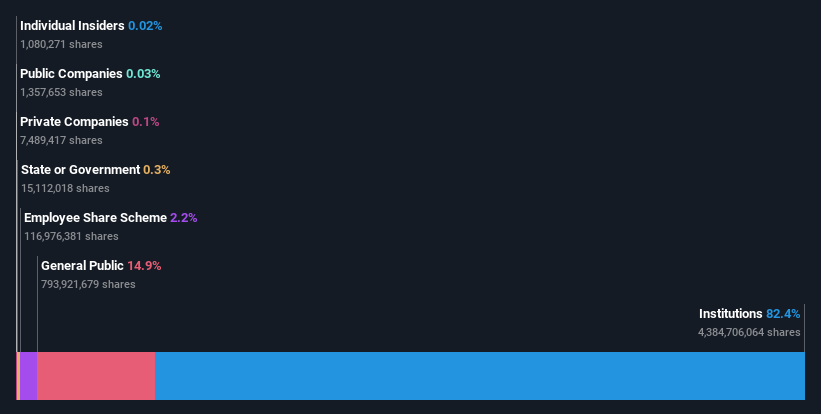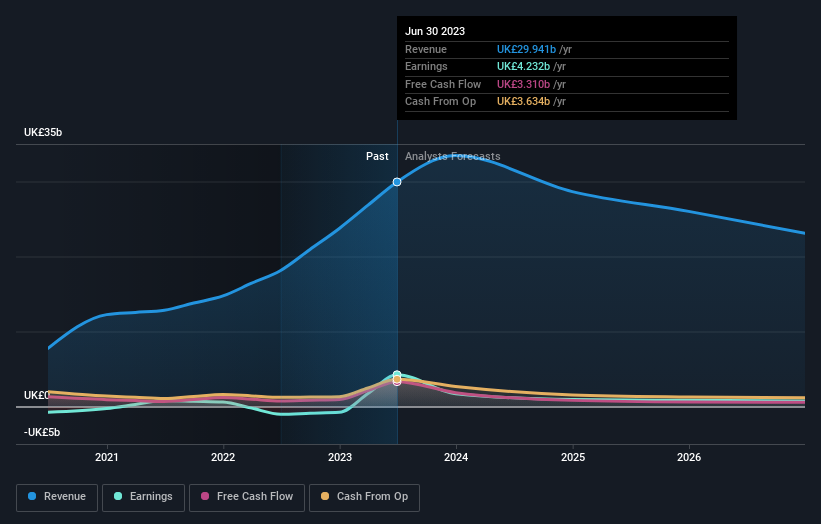- United Kingdom
- /
- Other Utilities
- /
- LSE:CNA
Institutional investors in Centrica plc (LON:CNA) lost 5.2% last week but have reaped the benefits of longer-term growth
Key Insights
- Significantly high institutional ownership implies Centrica's stock price is sensitive to their trading actions
- 50% of the business is held by the top 22 shareholders
- Insiders have bought recently
If you want to know who really controls Centrica plc (LON:CNA), then you'll have to look at the makeup of its share registry. With 82% stake, institutions possess the maximum shares in the company. Put another way, the group faces the maximum upside potential (or downside risk).
No shareholder likes losing money on their investments, especially institutional investors who saw their holdings drop 5.2% in value last week. However, the 43% one-year return to shareholders may have helped lessen their pain. But they would probably be wary of future losses.
Let's delve deeper into each type of owner of Centrica, beginning with the chart below.
View our latest analysis for Centrica

What Does The Institutional Ownership Tell Us About Centrica?
Institutions typically measure themselves against a benchmark when reporting to their own investors, so they often become more enthusiastic about a stock once it's included in a major index. We would expect most companies to have some institutions on the register, especially if they are growing.
We can see that Centrica does have institutional investors; and they hold a good portion of the company's stock. This suggests some credibility amongst professional investors. But we can't rely on that fact alone since institutions make bad investments sometimes, just like everyone does. It is not uncommon to see a big share price drop if two large institutional investors try to sell out of a stock at the same time. So it is worth checking the past earnings trajectory of Centrica, (below). Of course, keep in mind that there are other factors to consider, too.

Institutional investors own over 50% of the company, so together than can probably strongly influence board decisions. We note that hedge funds don't have a meaningful investment in Centrica. BlackRock, Inc. is currently the company's largest shareholder with 8.7% of shares outstanding. The Vanguard Group, Inc. is the second largest shareholder owning 4.7% of common stock, and Columbia Management Investment Advisers, LLC holds about 3.9% of the company stock.
A closer look at our ownership figures suggests that the top 22 shareholders have a combined ownership of 50% implying that no single shareholder has a majority.
Researching institutional ownership is a good way to gauge and filter a stock's expected performance. The same can be achieved by studying analyst sentiments. Quite a few analysts cover the stock, so you could look into forecast growth quite easily.
Insider Ownership Of Centrica
The definition of an insider can differ slightly between different countries, but members of the board of directors always count. Management ultimately answers to the board. However, it is not uncommon for managers to be executive board members, especially if they are a founder or the CEO.
Insider ownership is positive when it signals leadership are thinking like the true owners of the company. However, high insider ownership can also give immense power to a small group within the company. This can be negative in some circumstances.
Our most recent data indicates that insiders own less than 1% of Centrica plc. Being so large, we would not expect insiders to own a large proportion of the stock. Collectively, they own UK£1.5m of stock. In this sort of situation, it can be more interesting to see if those insiders have been buying or selling.
General Public Ownership
With a 15% ownership, the general public, mostly comprising of individual investors, have some degree of sway over Centrica. While this group can't necessarily call the shots, it can certainly have a real influence on how the company is run.
Next Steps:
I find it very interesting to look at who exactly owns a company. But to truly gain insight, we need to consider other information, too. Take risks for example - Centrica has 3 warning signs (and 2 which don't sit too well with us) we think you should know about.
If you would prefer discover what analysts are predicting in terms of future growth, do not miss this free report on analyst forecasts.
NB: Figures in this article are calculated using data from the last twelve months, which refer to the 12-month period ending on the last date of the month the financial statement is dated. This may not be consistent with full year annual report figures.
New: AI Stock Screener & Alerts
Our new AI Stock Screener scans the market every day to uncover opportunities.
• Dividend Powerhouses (3%+ Yield)
• Undervalued Small Caps with Insider Buying
• High growth Tech and AI Companies
Or build your own from over 50 metrics.
Have feedback on this article? Concerned about the content? Get in touch with us directly. Alternatively, email editorial-team (at) simplywallst.com.
This article by Simply Wall St is general in nature. We provide commentary based on historical data and analyst forecasts only using an unbiased methodology and our articles are not intended to be financial advice. It does not constitute a recommendation to buy or sell any stock, and does not take account of your objectives, or your financial situation. We aim to bring you long-term focused analysis driven by fundamental data. Note that our analysis may not factor in the latest price-sensitive company announcements or qualitative material. Simply Wall St has no position in any stocks mentioned.
About LSE:CNA
Centrica
Operates as an integrated energy company in the United Kingdom, Ireland, Scandinavia, North America, and internationally.
Flawless balance sheet and undervalued.
Similar Companies
Market Insights
Community Narratives



